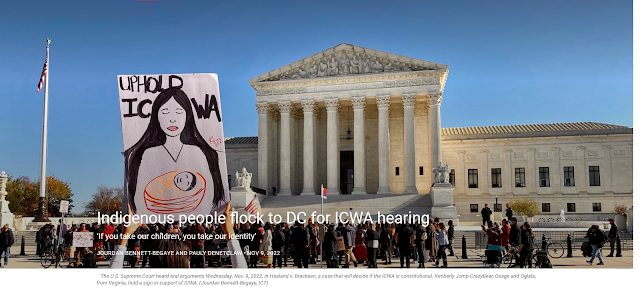‘If you take our children, you take our identity’
Approximately 60 stood in line waiting to sit inside the court to
witness the oral arguments. Many sat between the Capitol and court
listening to three hours of oral arguments on their headphones, and
others listened to the line of speakers and songs all morning and into
midday.
Haaland v. Brackeen challenges the Indian Child
Welfare Act, a law that has been referred to as the “gold standard” for
child welfare by many child welfare organizations. It was enacted in
1978 to “halt the unnecessary forced removal of Native kids from their
families,” said Sarah Kastelic, an enrolled citizen of the Native
Village of Ouzinkie and executive director of the National Indian Child Welfare Association.
Sarah
Kastelic, executive director of the National Indian Child Welfare
Association and an enrolled citizen of the Native Village of Ouzinkie,
stands outside the U.S. Supreme Court with a sign in her language in
Washington, D.C., on November 9, 2022. (Photo by Jourdan Bennett-Begaye,
ICT)
“So in our organization,
one of the things that we talk about is the recipe for colonization,”
Kastelic said. This recipe is “consistently followed by colonizers to
colonize Indigenous people.”She said there are five ingredients:
- “Take the land;”
- “Control the natural resources, especially the water;”
- “Usurp, replace Indigenous governance to delegitimize Indigenous thought;”
- “Undermine Native worldview, values, traditions, beliefs;” and
And
number five, “the most important ingredient,” she says, is to “sever
Native children from their sense of identity, from their culture, from
their sense of belonging, from that sense of connectedness to
something.”
This would meet the United Nations definition of genocide.
** BEST QUOTE
NATIVE AMERICA CALLING:
The fate of ICWA
Podcast: Play in new window | Download (Duration: 55:44 — 38.3MB) | Embed
Each side presented their oral arguments Wednesday to the U.S.
Supreme Court for the most serious challenge to the Indian Child Welfare
Act in recent memory. The decision in Haaland v. Brackeen will be a major force in the future of ICWA and the scope of tribal sovereignty. Today on Native America Calling, Shawn Spruce analyzes the legal debate from a Native perspective with Matthew Fletcher (Grand Traverse Band of Ottawa and Chippewa Indians), law professor at the University of Michigan Law School and author of the Turtle Talk blog; independent journalist Suzette Brewer (citizen of the Cherokee Nation); and Dr. Sarah Kastelic (Alutiiq), director of the National Indian Child Welfare Association.
 Full Brackeen Indian Child Welfare Act oral arguments (Indigenous Wire)
Full Brackeen Indian Child Welfare Act oral arguments (Indigenous Wire)
Oral arguments in Haaland v. Brackeen, a U.S. Supreme Court case that will decide whether the Indian Child Welfare Act (ICWA) of 1978
is constitutional and/or will be altered in any way, were heard
yesterday. Books will likely be written about this law and the case —
and their impact on tribal sovereignty — and we’ll be featuring much
more about the issues at stake in days to come.
For those so inclined, take a listen to the 3-hour oral arguments, which are online here. Transcript here.
Of
note: Not a single lawyer arguing the case in court yesterday were
Indigenous, although Natives with Jenner & Block and the Native
American Rights Fund did help prep for the case. A Native has never
served on the U.S. Supreme Court, and the high court usually decides
several cases each term that impact tribes and Indigenous citizens.









No comments:
Post a Comment
Please leave a comment.